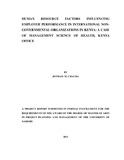| dc.contributor.author | Chacha, Jotham M | |
| dc.date.accessioned | 2013-07-30T11:44:23Z | |
| dc.date.available | 2013-07-30T11:44:23Z | |
| dc.date.issued | 2013 | |
| dc.identifier.citation | Degree of Masters of Arts Degree in Project Planning and Management of the University of Nairobi | en |
| dc.identifier.uri | http://erepository.uonbi.ac.ke:8080/xmlui/handle/123456789/52511 | |
| dc.description.abstract | Employee performance management continues to be one of the key factors that determine
the survival of NGO's in developing countries. Performance management has been
discussed widely and still continues to draw more attention. The question that is
emerging now is whether organizations are prepared to mitigate factors that influence
employee performance in organizations. This study focused on factors that influence
employee performance in international NGO's a case of Management Sciences of Health
Kenya office. The study is cross- sectional and it adopted a mixed research design with
both quantitative and qualitative approaches used. The qualitative approach was
descriptive while the quantitative approach was used to show the relationship between the
independent and the dependent variables. Questionnaires and document review were used
in data collection while tables, percentages, cross tabulation and triangulation techniques
were used in data analysis. Performance management allows managers and supervisors to
use tools and processes to enable staff do their best in their respective job roles and
assignments but in an environment where several other elements that influence employee
performance are in play. Researchers have investigated factors influencing employee
performance management but it is evident that there cannot be a single definition or
standard measure of performance since what constitutes performance varies in different
Sectors. The key objectives of the study were; to establish the influence of type of
employee engagement contracts on employee performance, to determine the influence of
training and development on employee performance, to establish the influence of
leadership style on employee performance, establish the influence of employee
motivation on performance and to determine the influence of rewards system on
employee performance. Findings from the study confirms that a significant association
exist between employee training and development, employee motivation and leadership
style and improved employee performance whereas type of employment contracts and an
organizations rewards policy have no significant association with improved employee
performance. In conclusion therefore of the five independent variables assessed in the
study only three have shown a significant level of association with improved employee
performance. It is therefore recommended that iNGOs need to develop and implement
focused training and development programs while at the same time embrace good
leadership styles as well as motivate their employees so as to realize improved
organizational performance. Since the NGO sector plays a significant role in developing
countries the study provides more knowledge on factors that affect employee
performance in the sector. | en |
| dc.language.iso | en | en |
| dc.title | Human resource factors influencing employee performance in international nongovernmental organizations in Kenya: a case of management science of health, Kenya office | en |
| dc.type | Thesis | en |
| local.publisher | Project Planning and Management | en |

